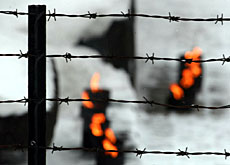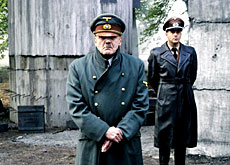Late recognition for Swiss peace mediator

A memorial plaque has been unveiled in Lucerne to honour a Swiss army officer who negotiated a secret peace deal during the Second World War.
Max Waibel’s negotiating skills led to the capitulation of the German forces in Italy and are believed to have saved many lives.
Political and military figures were among those who attended the ceremony in Lucerne on Friday – two days before the 60th anniversary of the end of the war in Europe.
The bronze plaque was erected in the presence of Waibel’s widow at the army training centre where he worked from 1951 to 1954.
“Courageous and opinionated, obeying not commands but his own conscience, he lit the beacon of peace which brought the war in Europe to an early close,” the inscription reads.
As well as saving many lives, Waibel is credited with preventing the torching of northern Italy by the retreating German Wehrmacht.
“Operation Sunrise”
Without the knowledge of his superiors, Waibel entered into lengthy negotiations between the German and allied troops.
The undercover “Operation Sunrise”, which he directed, finally resulted in a ceasefire in northern Italy that came into force on May 2, 1945.
The accord is thought to have persuaded the Germans to give up the battle on other fronts.
On May 8 the warring parties in Europe laid down their arms. According to the historian Edgar Bonjour, “Operation Sunrise” had shortened the war by between six and eight weeks.
In the event of a forced retreat the German forces had been given the order to burn the land behind them. By negotiating a ceasefire, Waibel is thought to have saved the region’s rich cultural heritage from destruction.
Reproach
For many years the story of the army information officer remained secret. Waibel was even reproached by the Swiss government for acting independently and breaching Switzerland’s strict neutrality.
Despite that, he went on to lead an infantry division.
In a speech to mark the occasion the former state secretary, Franz Blankart, said he understood the reasons why Waibel had disobeyed orders. Sometimes delicate missions had to be kept quiet, he said.
If Waibel had revealed his plan to his superiors, it would have been stopped. The government would have considered it too audacious and risky, Blankart said.
Waibel had recognized the dilemma he was in, but chose to go with his conscience, he added.
swissinfo with agencies
Swiss secret service officer Max Waibel led a secret mission which brought about the capitulation of the German army in northern Italy in 1945.
Experts say his actions shortened the war by six to eight weeks.
He is also credited with saving many lives and the cultural heritage of the area.
Instead of hailing him as a peace negotiator, the government reproached Waibel for infringing Swiss neutrality.

In compliance with the JTI standards
More: SWI swissinfo.ch certified by the Journalism Trust Initiative


You can find an overview of ongoing debates with our journalists here . Please join us!
If you want to start a conversation about a topic raised in this article or want to report factual errors, email us at english@swissinfo.ch.